SVG Venue Summit: How Game-Presentation Departments Entertain Fans in New York City
Madison Square Garden, Red Bulls, Devils, Mets, Giants highlight their game-day content strategy
Story Highlights
It’s not so easy being a sports team playing in the New York City metropolitan area. Competing with many other forms of entertainment, the franchises and venues have to attract the attention of fans on a nightly basis. At the 2023 SVG Venue Summit at UBS Arena on March 13-14, representatives of five local professional organizations — Madison Square Garden VP, Event Presentation, Matt Coy; New York Red Bulls Director, Event Production, Brooke Eveler; New Jersey Devils Senior Director, Live Experience and Production, Joe Kuchie; New York Mets Executive Director, In-Game Operations, Brendan McKeon; and New York Giants VP/Executive Producer Don Sperling — discussed how they combat the issue of performing in a saturated market and how they represent their respective fanbase in in-venue content, along with providing insights into what makes their productions tick.
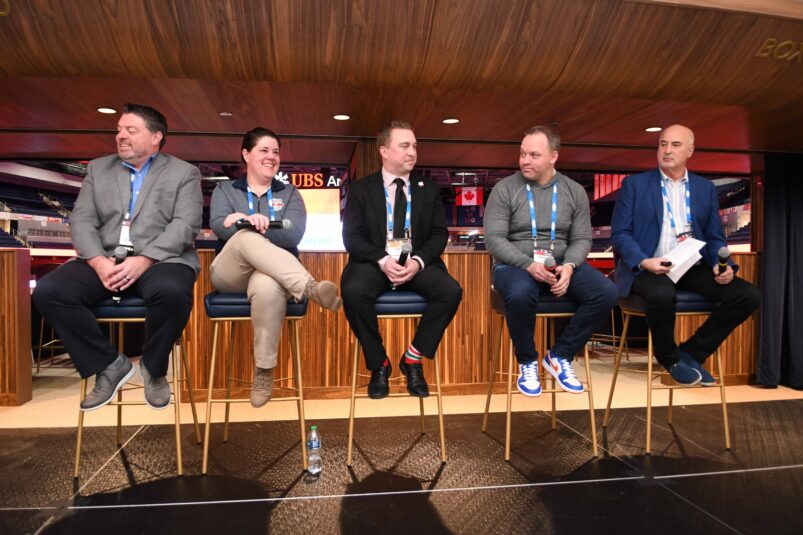
From left: MSG’s Matt Coy, New York Red Bulls’ Brooke Eveler, New Jersey Devils Joe Kuchie, New York Mets’ Brendan McKeon, and New York Giants’ Don Sperling highlight what it’s like to produce game-day entertainment in New York City.
How does a team stand out in New York City?
Coy: It’s a different animal to compete in New York, but everyone tries to capture that piece of the city by incorporating all of these elements in their show. Whether it be for the Rangers or Knicks, it could be a Broadway singer performing the National Anthem to bring that “wow” factor. We’re creating viral moments with Ryan Reynolds and Henrik Lundqvist in the crowd or Fat Joe singing along to karaoke that’s being done on the videoboard to establish that communal feeling that’s attracting people to our games. We’re also competing with the broadcast networks, so our graphics have to be good, if not better. From doors open until [the fans] leave, we’re playing a variety of music in hopes that we play someone’s favorite song. We want to show elements that you won’t see at a Broadway show, like Vixi Live from The Famous Group, allowing fans to take over the big screen.
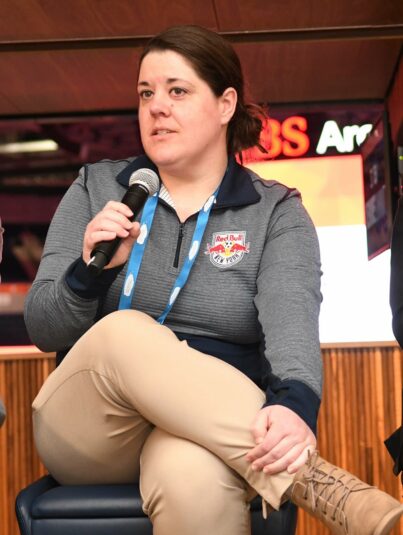
Brooke Eveler: “It’s about finding that balance between the traditional values of the soccer experience that’s played in places like Europe and Americanizing it for the New York audience.”
Eveler: It’s very convenient that we have the only soccer-specific stadium in the area. For us specifically, the league has been around for 25 years, but it’s still a new sport in the American landscape. Our show is completely different from when I started five years ago. It was very much the idea of letting the game be the experience, but that doesn’t quite work in New York because sports fans in this city are used to the entertainment value from other teams’ games. Now we have an in-arena host, Ally Melendez, a live DJ, and crowd prompts. You can imagine crowd prompts to make noise in a game like soccer, but it’s what our fanbase is used to seeing, and we have to deliver [those elements] to keep them coming back.
We have a very ardent supportive section who are very traditional and don’t like when we do those features, but I’ve met with them to say, “I understand that you might not like it, but there’s another three-quarters of the arena that I’m trying to entertain.” This might be their first game, and we want them to have a good time. It’s about finding that balance between the traditional values of the soccer experience that’s played in places like Europe and Americanizing it for the New York audience.
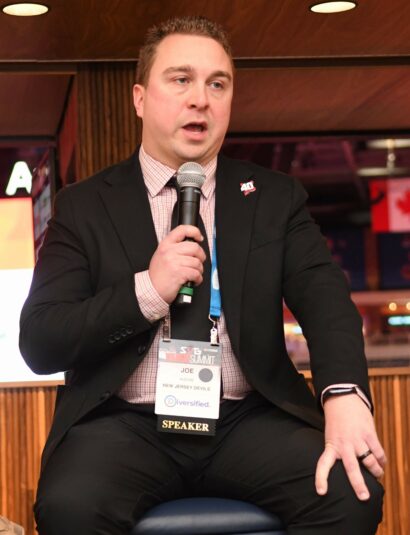
Joe Kuchie: “We want to challenge each other and go to other venues to see what other teams are doing.”
How are you tapping into local themes as the only “New Jersey” team?
Kuchie: We take our “Made in Jersey” mantra seriously. We’re going to recognize people that are from New Jersey and have been here their entire life, but there are also storylines where you can come from somewhere else and make yourself in New Jersey. Nico Hischier is from overseas, and Travis Zajac is from Canada, but, when Nico was named captain and Travis played his 1,000th game, we did a huge campaign about how these guys were born somewhere else but their careers were made in New Jersey. We don’t try to shove this second part down your throat, but we try to integrate New Jersey into our overall brand, look, and feel. If you look at our videoboard show, you’ll see a neon-diner-sign feel to our graphics package, and the background is a subtle map of the state. We don’t necessarily have as many celebrities as the Garden, but we work with local celebs from New Jersey that want to be involved. Patrick Warburton, who played Puddy [in Seinfeld], offered to do our open video narration at no cost. We’re working with a lot of New Jersey music right now, specifically down the shore. We had our NHL Draft party at the Stone Pony. Working in those New Jersey vibes without necessarily making it overbearing has been important to us. We’ve gotten into a really good groove over the last couple years.
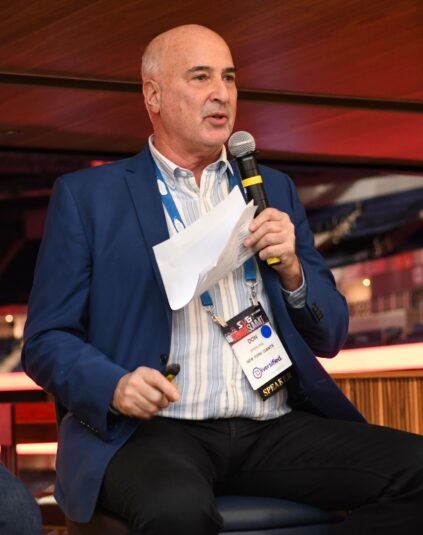
Don Sperling: “When you win, everybody’s in a good mood, but, when you lose, nobody’s happy. Winning and losing really predicts how you do your rundown for game day.”
How does winning and losing affect your game day and fanbase?
Sperling: After a long drought, we had a pretty successful season. When you win, everybody’s in a good mood, but, when you lose, nobody’s happy. Winning and losing predicts how you do your rundown for game day. Since we have fans who have been coming for years and newer fans coming for the first time, you have to keep up with not only technology but also cultural trends. This season, coincidentally with the team doing well, we shot T-shirts into the stands for the first time. I think we found a successful mix because the team, the GM, the coach, and everyone with the Giants liked it.
How do you differentiate content in MLB with three-game or four-game series? How do you prepare for a 10-game home stand with not much time between games?
McKeon: I lean on three things. The first one is fans not wanting to miss any of our home games. We brought in a live DJ on Friday nights, and opposing players have been quoted saying it felt like they were playing in a nightclub. Second, I want someone that comes to New York to put a Mets game on their to-do list. We have our hardcore fans, but we want to gain new fans that are visiting the city. Third, 81 games give you a lot of time to experiment and have fun.
We’ll come up with bits in the second inning that we’ll do in the fourth inning. Thankfully, the pitch clock is going to move our production along a lot faster, but there’s still a lot of room left to entertain people. This mentality also gives you a chance to be reactive since the Mets are playing almost every night. When a story comes out that’s really funny, you can have some fun with it in your stadium that night by posting stuff on the videoboard. The end goal is to have someone take a picture of the videoboard, post it on social media, and have it blow up and go viral. For instance, Edwin Díaz’s entrance song became really popular, so we had Timmy Trumpet come out and serenade him onto the field.
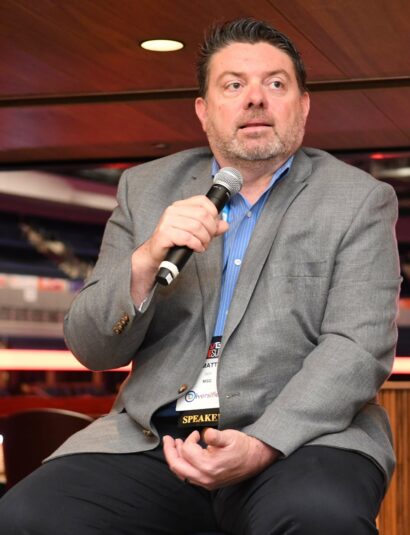
Matt Coy: “It’s a different animal to compete in New York, but everyone tries to capture that piece of the city by incorporating all of these elements in their show.”
What goes into preparing for rivalry games?
Coy: With the Rangers being an Original Six franchise or the history that the Knicks have with other teams and the emergence of the Nets in Brooklyn, rivalries are huge in New York. There’s a different mentality and feel that go into those games. We build that up and dive into that narrative. [Red Bulls’] Brooke [Eveler] has the supporter section, and, while fans who grew up here loved watching games in the blue seats, that section is so up high now. It has turned into something that you have to tap into in order to get that instant and organic sense of passion. For instance, that could be adding that extra pause after team introductions to allow fans to boo the opposing team. We’re definitely more conservative and try not to push those elements too much, but we want the fans to be a part of [this rivalry game].
Eveler: The Red Bulls and New York City Football Club (NYCFC) are New York City’s two soccer clubs, but, for the New York Derby, New York is red. Whether it’s our marketing efforts or taking over Times Square, we lean heavily into our Manhattan roots during that night. In terms of in-game presentation, I don’t have to do a lot because our fanbases hate each other. Our supporters bring their drums to make as much noise as possible for our biggest match of the year.
Kuchie: The playoffs show how good this [game-presentation] group is at their jobs when we react on the fly. We have a script, but I tend to ignore it on these games because you’re reacting to who’s in the crowd, what they’re doing, what kind of noise prompts we want to do, and making sure that that building has that buzz throughout the entire game for a home-ice advantage. We had our Reverse Retro game against Rangers on Jan. 7, and the entire third period was filled with fan prompts and getting people on their feet because the building was electric on a Saturday afternoon at 1 p.m. We have our logo beatdowns, which is taking a clip from a movie, putting an opposing team’s logo on it, and beating the crap out of it. It’s corny, but our fans love it. We have our typical traditions in our arena that they’ve become accustomed to, but, ultimately, we don’t want to give any opposing team’s fans the comfort of being in our building.
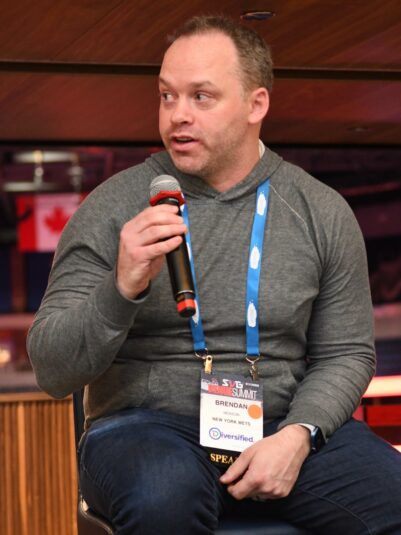
Brendan McKeon: “I lean on three things: fans’ not wanting to miss any of our home games, wanting someone that comes to New York to put a Mets game on their to-do list, and 81 games give you a lot of time to experiment and have fun.”
McKeon: Our manager, Buck Showalter, actually asked us to tone down on some of our stuff because he thought it was motivating the other team. He actually watches the videoboard show and has critiques on it, and he wants us to promote our guys instead of tearing down the other team. We took that direction and decided to highlight the personalities of the players on our side.
Sperling: We stay away from cheesy trash talk because it could turn into bulletin-board material, so, when Dallas and Philadelphia come into town, we play some of our greatest moments against each team throughout the game. We do everything that we can to capitalize on the rivalry and build up that story all week leading up to the matchup. We want to have our fans feeling the energy and passion on during the week. By the time the calendar rolls to Sunday, that’s when you can bring it all home.
Can you offer tips to elevate in-venue production?
Coy: There are always things to improve. We’re always striving for the perfect show, and you never get it because something always happens in live entertainment. We’re focusing on implementation of new technologies and the initiatives that can help our show. Everyone is distracted by their phones, so it’s trying to figure out either how we can get them to put their phones down or how we can integrate their phones into our shows.
Eveler: Working for Red Bull, one of the most innovative brands in the world, allows me to try new things. I can do something at one game to see if it sticks. If it doesn’t, we won’t do it the next game without anyone really remembering.
Kuchie: I think it’s about challenging each other and going to other venues to see what other teams are doing. We want to ask ourselves, “What [new things] can we come up with and how can we do [preexisting ideas] better?” With all of the New York teams being relatively close to each other and also knowing each other quite well, we can share concepts but also see something that the Rangers are doing and want to figure out a way of topping it.
McKeon: Make sure that you’re powering all of your technology ahead of the start of the regular season. If you’re building out a new room, like we did over the offseason, things can happen where timelines are shifted and everything turns into a crunch. For example, if we didn’t have the lockout last year, where the season was pushed back two weeks, we would’ve produced our first home stand from a truck in the compound. Delays and fluid timetables are real, so it’s important that you listen and follow those schedules.
Sperling: It’s about establishing camaraderie with other teams. We may hate each other on the field, but we are a tight-knit group. We want to help each other out by giving and receiving great advice in order to go above and beyond for our respective fanbases.
This discussion took place at the 2023 SVG Venue Summit at UBS Arena. For a full video version of this panel and other discussions, please visit SVG PLAY.
